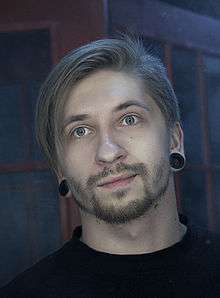Ukrainians in Hungary
| |||||
| Total population | |||||
|---|---|---|---|---|---|
|
(5,000[1] 0.05% of Hungary's population (2009) ) | |||||
| Regions with significant populations | |||||
| Szabolcs-Szatmár-Bereg County, Borsod-Abaúj-Zemplén County, Budapest | |||||
| Languages | |||||
| Hungarian, Ukrainian, Russian | |||||
| Religion | |||||
| Orthodox with Judaism and Catholicism | |||||
| Related ethnic groups | |||||
| Ukrainians in Slovakia, Ukrainians in Germany, Ukrainians, Ukrainian Canadians, British Ukrainians, Ukrainian Australians, Rusyn Americans, Ukrainians in Poland, other Slavic peoples especially East Slavs | |||||
Ukrainians in Hungary are a small group, numbering at around only 5,000 people, but are notable because of the shared border by Ukraine and Hungary, making them a national minority (one who is native to the nation bordering the one in which they live).
Past history
In 1910, according to the census, they formed 470,000 people[2] (4.69% of the population), but this was before the Treaty of Trianon; after which Hungary lost Transcarpathia to Czechoslovakia. This removed virtually all Hungarian land with large amounts of Ukrainians, and led to the gradual reduction of the community to its present size of 5,000 people also through their migration after Trianon to the Russian empire.
As a result of the First Vienna Award, Transcarpathia once more became part of Hungary in 1938. After the World War II, it was incorporated into to the Soviet Union as a part of the province of Ukraine by the Treaty of Paris in 1947.
References
- ↑ "From Hungarian census via www.eliamep.gr" (PDF). http://www.eliamep.gr/wp-content/uploads/en/2009/04/migsys_hungary_ukrainians.pdf. Retrieved 2012-06-28. External link in
|publisher=(help) - ↑ Ethnographic Boundaries of Ukraine (The Ukrainian people) (English)
| ||||||||||||||||

